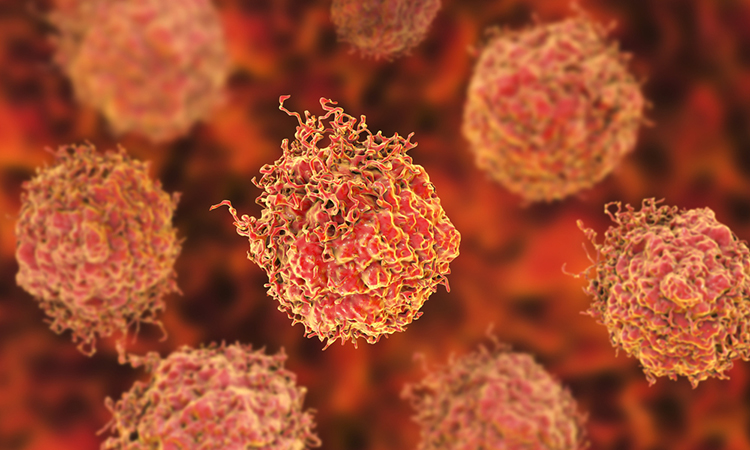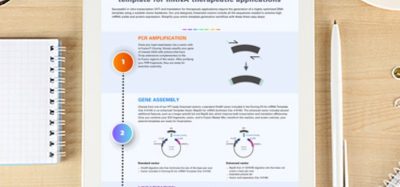Neoantigen-directed cancer treatment
Posted: 9 June 2023 | Taylor Mixides (Drug Target Review) | No comments yet
This exclusive interview with Dr Sharon Benzeno, Chief Commercial Officer, Immune Medicine at Adaptive Biotechnologies, explores research on T-cell therapy for cancer, which has seen the first TCR-based therapeutic candidate progress to clinical development, offering promising advancements in innovative cancer treatments.


This exclusive interview with Dr Sharon Benzeno, Chief Commercial Officer, Immune Medicine at Adaptive Biotechnologies, explores research on T-cell therapy for cancer, which has seen the first TCR-based therapeutic candidate progress to clinical development, offering promising advancements in innovative cancer treatments.


Adaptive Biotechnologies and Genentech entered a partnership in 2019 to develop, manufacture and commercialise novel neoantigen directed T-cell therapies for the treatment of a broad range of cancers. Neoantigen-directed T-cell therapy is a potentially powerful approach that harnesses a patient’s own immune system to fight cancer. One aspect of the collaboration focuses on screening and identification of therapeutic T-cell receptors (TCRs) to target a common shared neoantigen present in many cancer patients.
Adaptive’s pioneering TCR discovery platform enabled the identification and characterisation of naturally occurring, fully human TCRs at unprecedented scale and speed. This research has resulted in the first TCR-based therapeutic product candidate from the partnership to advance into clinical development. Looking ahead, Genentech has responsibility for clinical, regulatory and commercialisation efforts for any T-cell therapy product candidate.
What were the key findings or achievements from the pre-clinical research conducted by the Adaptive-Genentech partnership that led to the submission of the investigational new drug (IND) application?
Adaptive Biotechnologies’ collaboration with Genentech is focused on advancing TCR-based cellular therapies in oncology. Within the collaboration, Adaptive is responsible for end-to-end preclinical TCR discovery. Our TCR efforts are focused on clinically relevant neoantigen targets that are found in many cancer patients. As part of the TCR discovery process and preclinical data package, Adaptive performs rigorous functional characterisation and safety assessments of potent, therapeutic grade antigen-specific TCRs. Genentech is responsible for engineering adaptive-discovered TCRs into T cells and manufacturing the T cell therapy product candidate.
Could you explain the specific mechanisms or techniques used in the pre-clinical research to translate the genetics of the adaptive immune system into clinical products for disease detection and treatment?
At Adaptive, we’ve built an end-to-end TCR discovery approach, which combines our team’s expertise in high-throughput sequencing, machine learning and cancer immunology. Our differentiated platform enables identification and characterisation of naturally occurring, fully human TCRs at unparalleled scale and speed.
We can scan hundreds of millions of T cells in one experiment, in a matter of weeks.
What types of diseases or conditions were targeted in the pre-clinical research phase?
This first T-cell therapy product targets a common shared neoantigen found in patients with solid tumours. An antigen is a protein that can induce an immune response in the body. While tumour cells share a majority of their DNA with healthy cells, they also carry numerous unique mutations. Some of these mutations result in the production of new antigens, called “neoantigens,” which offer a seek-and-destroy signal for our immune system, killer T cells, to home in on.
Were there any notable safety or efficacy results observed during the pre-clinical studies that support the advancement of this TCR-based therapeutic product candidate into clinical development?
Adaptive developed a preclinical data package that includes results on identification, functional characterisation and safety de-risking of potent, therapeutic-grade TCRs. Under our Genentech collaboration, we cannot comment on specific results of a TCR data package selected by Genentech.
How did the pre-clinical research findings demonstrate the potential of the TCR-based T-cell therapy as a novel and effective treatment approach compared to existing therapies in the field?
Adaptive’s preclinical findings resulted in the identification and selection of a clinically optimal TCR to be leveraged for the development of neoantigen-directed cancer cell therapies. Cell therapy has become a powerful treatment option for certain hematologic cancers, but there is much work to be done to realise its broader potential. The next generation of cell therapies has the potential to significantly enhance targeted tumour killing for people with cancer and treat a broader set of tumour types.
Cell therapy has become a powerful treatment option for certain hematologic cancers
Can you provide insights into the timeline and steps involved in the pre-clinical research phase leading up to the submission of the IND application for the TCR-based T-cell therapy?
At Adaptive, we use our validated TCR discovery approach to discover millions of TCRs for targets of interest. This TCR discovery process can be as rapid as a matter of weeks. Upfront, we select TCRs that are the best binders to a target, followed by rigorous functionality and safety assessments to further de-risk these TCRs and filter out lesser potent TCRs. Once an optimal, clinical grade TCR is selected by Genentech, Genentech has responsibility for clinical, regulatory and commercialisation efforts for any T-cell therapy product candidate application.
Author Bio:


Sharon Benzeno
Dr Sharon Benzeno is the Chief Commercial Officer, Immune Medicine and leads the Drug Discovery group at Adaptive Biotechnologies, a commercial-stage biotech company that aims to translate the genetics of the adaptive immune system into clinical products to diagnose and treat disease. Before joining Adaptive in 2014, Sharon was Senior Director at Elsevier Inc., a healthcare informatics company. Prior to Elsevier, Sharon co-led the oncology business unit at Capgemini SE, a consulting and technology services company. She also served in a variety of management roles at AstraZeneca plc. Sharon holds a PhD in biomedical sciences from New York University School of Medicine, an MBA in finance and leadership from New York University Stern School of Business and a BA in biochemistry from New York University. Sharon completed a postdoctoral fellowship in cancer biology at the University of Pennsylvania Abramson Cancer Center.
Related topics
Cell Line Development, Cell Regeneration, Cell Therapy, Cell-based assays, DNA, Stem Cells, T cells, Targets
Related conditions
Cancer
Related organisations
Adaptive Biotechnologies
Related people
Sharon Benzeno (Adaptive Biotechnologies)








